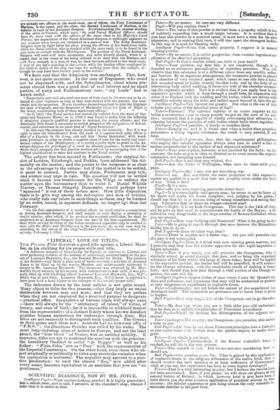" LIBERAL" LOVE OF TITLES.
THE Preston Pilot discovers a good joke against a Liberal Mem- ber, in his stickling for his proper style and title. "A ludicrous instance of this craving for flattery, so common to Liberals and otherprofessing deriders of the honours of aristocracy, occurred lately in the per- son of Laurence Heyworth, Esq., the Teetotal Member for Derby. fhe collector of his district—very likely a plain man of business—sent a schedule of Assessed Taxes to be filled up by the worthy Member, and unfortunately addressed it simply to Mr. Laurence Heyworth. The document was returned by Mr. Hey- worth's livery servant, by his request, with instructions to wait until it was pro- perly filled up with his fitting title of honour—' Laurence Heyworth, Esq., el.P.'; which was at once done. Laurence Hepworth, Esq., M.P.'s horse is reported to have gone back a hand higher as the conveyer of his owner's proper title."
The inference drawn by the local satirist is not quite sound. Many object to titles for two reasons,—that they imply an undue distinction( between man and man ; and that they are useless when they are not employed for a practical purpose to designate a practical office. Inequalities of various kinds will always exist —there will always be the " aristocracy of talent," of virtue, of beauty, and even of birth ; for it is impossible to withhold respect from the representative of a distinct family whose known duration gratifies human aspirations for endurance through time. But titles are not necessary to distinguish such qualities. The Greeks in their prime used them not : Aristotle had no honorary affix of "-F.R.S."; the illustrious Pericles was called by his name. The most long-enduring class of nobles in Europe, and not the least proud, the "blue blood" of Venice, was an untitled nobility. E converso, titles are apt to confound the spurious with the genuine : the hereditary Oudinot is called "de Reggio" as well as his father : " Plain John " sits as " Peer" with the representative of the Imperial Courtenays. On the other hand, even those who ob- ject artistically or politically to titles may resent the omission when the application is universal. The negative may amount to a posi- tive predication : to omit the absurd "Esq." now added after every name, becomes equivalent to an assertion that you are "no gentleman."


























 Previous page
Previous page